Unlocking Growth: The Power of Salesforce ERP Integration
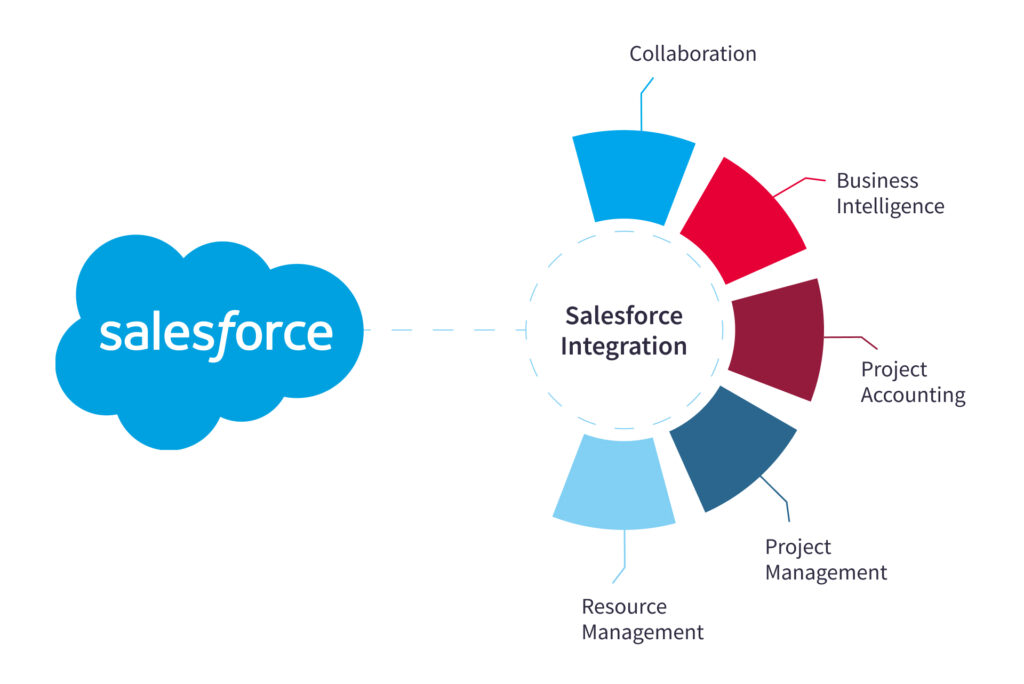 .
.
Welcome, fellow business leaders! In today’s dynamic and competitive landscape, businesses are constantly seeking ways to optimize their operations, streamline processes, and unlock new avenues for growth. One powerful tool that can help you achieve these goals is the seamless integration of Salesforce with your Enterprise Resource Planning (ERP) system.
Imagine a world where your sales and marketing teams have real-time insights into inventory levels, order fulfillment status, and customer financial data. Picture a scenario where you can effortlessly track customer interactions, manage orders, and analyze financial performance from a single, unified platform. This is the power of Salesforce ERP integration, a transformative solution that can revolutionize your business operations and propel you towards unprecedented success.
Why is Salesforce ERP Integration So Important?
The traditional approach to managing business operations often involves separate, siloed systems for sales, marketing, customer service, finance, and inventory. This fragmented approach creates inefficiencies, delays, and communication breakdowns, hindering your ability to make informed decisions and optimize your resources. Salesforce ERP integration breaks down these silos, creating a unified platform that connects all aspects of your business.
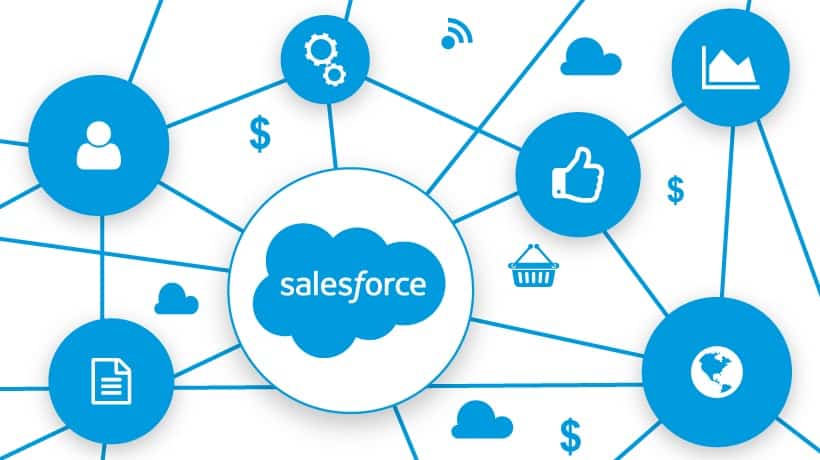 .
.
The Benefits of a Unified Platform
By integrating Salesforce with your ERP system, you gain access to a centralized hub for all your critical business data. This integration allows for real-time data synchronization, eliminating manual data entry and ensuring consistent information across all departments. With a unified platform, you can:
- Improve Customer Experience: Provide personalized customer service by accessing a comprehensive view of customer interactions, purchase history, and account details.
- Enhance Sales Efficiency: Empower sales teams with real-time insights into inventory levels, order fulfillment status, and customer financial data, enabling them to close deals faster and increase revenue.
- Optimize Operations: Streamline order processing, inventory management, and financial reporting by integrating data from your ERP system with your CRM.
- Gain Real-Time Visibility: Track key performance indicators (KPIs) and gain real-time visibility into your business operations, allowing you to make informed decisions and adjust strategies as needed.
- Reduce Costs: Eliminate manual data entry, minimize errors, and streamline processes, leading to significant cost savings.
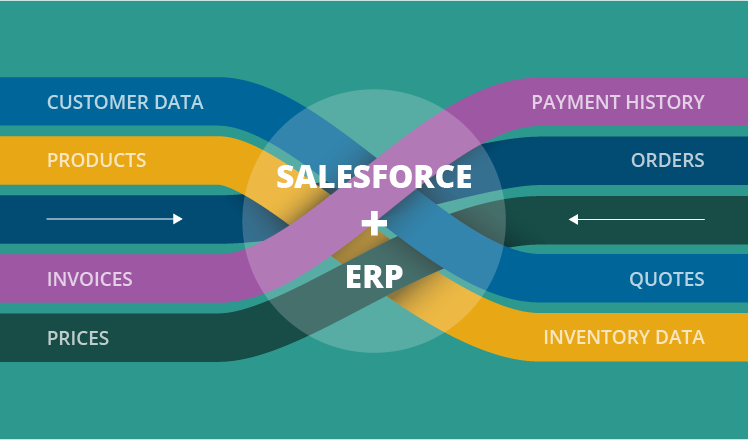 .
.
Navigating the Integration Journey
While the benefits of Salesforce ERP integration are undeniable, it’s crucial to understand the complexities involved in implementing this solution. The integration process requires careful planning, expertise, and a comprehensive understanding of your business needs.
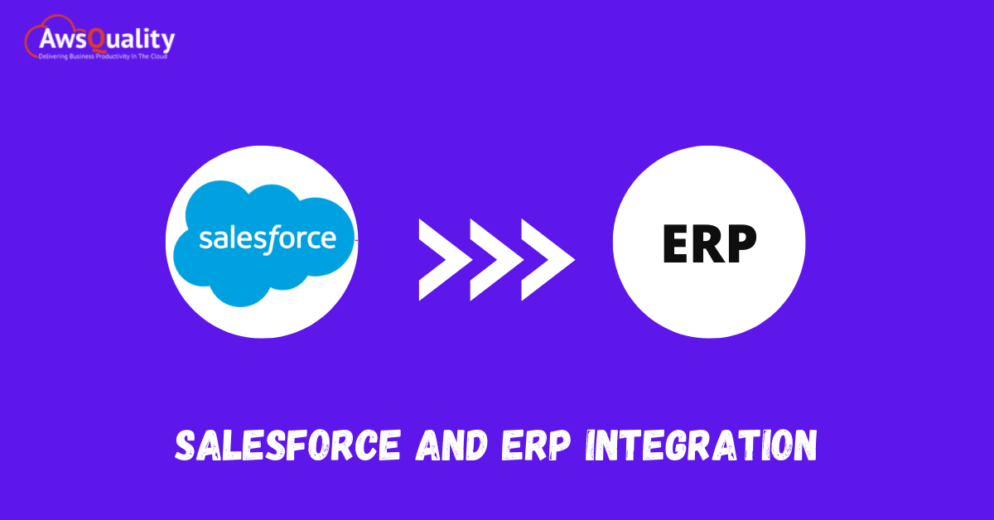 .
.
Key Considerations for Successful Integration
- Data Mapping: Carefully map your Salesforce and ERP data fields to ensure accurate data synchronization and prevent inconsistencies.
- Security and Compliance: Implement robust security measures to protect sensitive data and ensure compliance with relevant regulations.
- Integration Strategy: Choose the right integration approach, whether it’s a direct integration, middleware solution, or cloud-based platform.
- Testing and Validation: Thoroughly test the integrated system to ensure data accuracy, functionality, and performance before deployment.
- Training and Support: Provide comprehensive training to your team and ensure ongoing support to address any technical issues or questions.
 .
.
Understanding the Advantages and Disadvantages
Advantages of Salesforce ERP Integration:
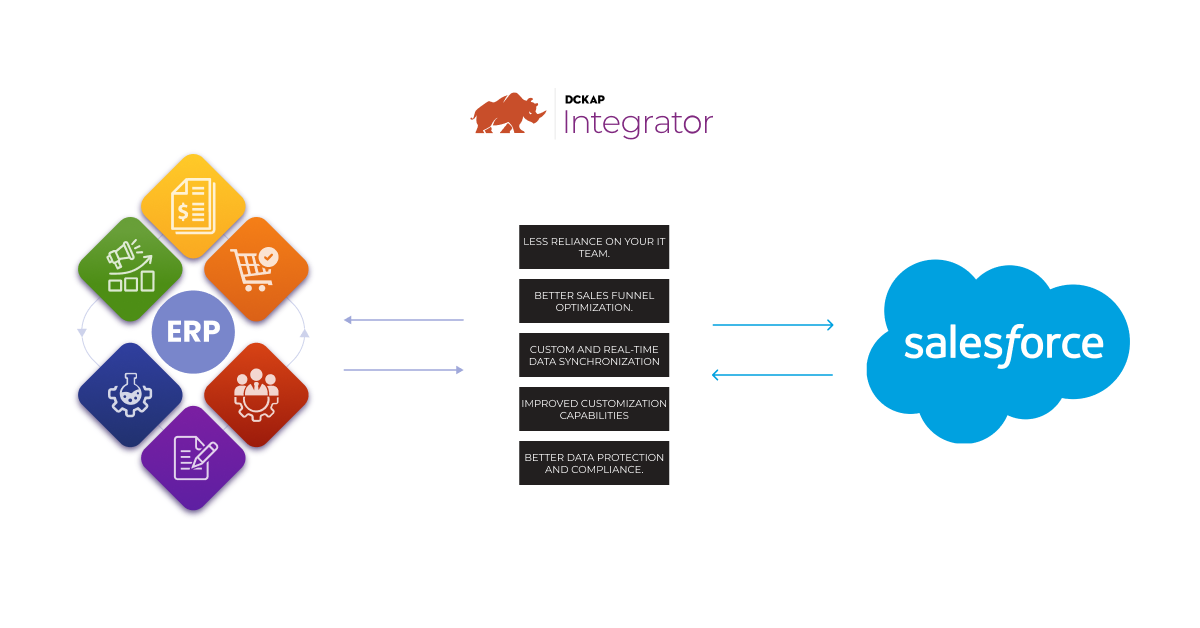 .
.
- Enhanced Data Visibility: Gain real-time access to all your critical business data, providing a comprehensive view of your operations.
- Improved Collaboration: Foster seamless communication and collaboration between departments by sharing data and insights across the organization.
- Increased Efficiency: Streamline processes, reduce manual tasks, and automate workflows, leading to significant efficiency gains.
- Better Decision-Making: Make data-driven decisions based on real-time insights and comprehensive data analysis.
- Improved Customer Satisfaction: Provide personalized customer service, faster response times, and a seamless experience.
Disadvantages of Salesforce ERP Integration:
- Complexity: Implementing a Salesforce ERP integration can be a complex process that requires expertise and careful planning.
- Cost: The cost of implementing and maintaining a Salesforce ERP integration can be significant, depending on the complexity of the project.
- Data Migration: Migrating data from your ERP system to Salesforce can be a time-consuming and challenging process.
- Customization: Customizing the integration to meet your specific business needs may require additional development and resources.
- Technical Expertise: You may need to hire or train technical personnel to manage and support the integration.
The Impact of Salesforce ERP Integration
The impact of Salesforce ERP integration on your business can be profound, driving significant improvements in efficiency, productivity, and customer satisfaction. However, it’s crucial to carefully consider the advantages and disadvantages, plan for potential challenges, and choose the right integration approach to ensure a successful implementation.
Key Considerations for a Successful Implementation
- Clear Business Objectives: Define your business goals and how Salesforce ERP integration will help you achieve them.
- Comprehensive Planning: Develop a detailed implementation plan that outlines the scope, timeline, resources, and key stakeholders.
- Expert Partner: Engage a reputable Salesforce partner with expertise in ERP integration to guide you through the process.
- Change Management: Prepare your team for the change and provide training to ensure a smooth transition.
- Ongoing Maintenance: Establish a maintenance plan to ensure the integration remains stable, secure, and optimized.
Unlocking Growth with Salesforce ERP Integration
By embracing Salesforce ERP integration, you can unlock a world of possibilities for your business. This transformative solution empowers you to streamline operations, improve customer experiences, gain real-time visibility, and make data-driven decisions that drive growth.
The Future of Business Operations
As technology continues to evolve, the integration of Salesforce with ERP systems will become increasingly crucial for businesses of all sizes. This powerful combination will enable organizations to stay ahead of the curve, adapt to changing market conditions, and achieve sustainable success.
FAQs
1. What are the different types of Salesforce ERP integrations?
There are several types of Salesforce ERP integrations, including:
- Direct Integration: This involves directly connecting Salesforce and your ERP system using APIs or other integration tools.
- Middleware Solutions: These solutions act as intermediaries between Salesforce and your ERP system, providing a layer of abstraction and simplifying the integration process.
- Cloud-Based Platforms: These platforms offer pre-built integrations with Salesforce and various ERP systems, providing a quick and easy way to connect your systems.
2. What are the key considerations for choosing an integration approach?
When choosing an integration approach, consider factors such as:
- Complexity of your systems: If your systems are complex, a middleware solution or cloud-based platform may be more suitable.
- Technical expertise: If you have limited technical resources, a cloud-based platform may be a better option.
- Budget: The cost of integration can vary depending on the approach you choose.
- Timeline: The time it takes to implement the integration can vary depending on the complexity of the project.
3. How can I ensure data accuracy and consistency during integration?
To ensure data accuracy and consistency, it’s essential to:
- Carefully map data fields: Ensure that the data fields in Salesforce and your ERP system are properly aligned.
- Validate data during migration: Perform thorough data validation to identify and correct any errors.
- Implement data quality monitoring: Continuously monitor data quality to identify and address any issues.
4. What are the security considerations for Salesforce ERP integration?
Security is paramount when integrating Salesforce with your ERP system. Key considerations include:
- Data encryption: Encrypt sensitive data in transit and at rest.
- Access control: Implement robust access control measures to restrict access to sensitive data.
- Regular security audits: Conduct regular security audits to identify and address vulnerabilities.
5. How can I train my team on the integrated system?
Provide comprehensive training to your team on the integrated system, covering:
- System functionality: Explain the features and functionality of the integrated system.
- Data access and navigation: Guide users on how to access and navigate data within the system.
- Workflows and processes: Explain the new workflows and processes that have been implemented.
- Troubleshooting and support: Provide resources and support for addressing any technical issues.
6. What are the benefits of using a Salesforce partner for integration?
Engaging a Salesforce partner can provide numerous benefits, including:
- Expertise: Salesforce partners have deep expertise in Salesforce and ERP integration.
- Best practices: They can help you implement best practices for integration.
- Support and maintenance: They can provide ongoing support and maintenance for the integrated system.
- Faster implementation: They can help you implement the integration faster and more efficiently.
7. How can I measure the success of Salesforce ERP integration?
Measure the success of your integration by tracking key metrics such as:
- Customer satisfaction: Track customer satisfaction scores and feedback.
- Sales efficiency: Monitor sales conversion rates, average deal size, and sales cycle time.
- Operational efficiency: Track order fulfillment time, inventory accuracy, and financial reporting accuracy.
- Return on investment (ROI): Calculate the ROI of the integration by considering cost savings, efficiency gains, and revenue growth.
8. What are some common challenges faced during Salesforce ERP integration?
Common challenges during integration include:
- Data mapping and migration: Ensuring accurate and consistent data migration can be challenging.
- Integration complexity: Integrating complex systems can require significant technical expertise.
- Security and compliance: Meeting security and compliance requirements can be complex.
- Change management: Preparing your team for the change and ensuring a smooth transition can be challenging.
9. What are some best practices for successful Salesforce ERP integration?
Best practices for successful integration include:
- Define clear business objectives: Clearly define your business goals and how the integration will help you achieve them.
- Develop a comprehensive plan: Create a detailed implementation plan that outlines the scope, timeline, resources, and key stakeholders.
- Engage a reputable partner: Choose a Salesforce partner with expertise in ERP integration.
- Thoroughly test the integration: Test the integrated system to ensure data accuracy, functionality, and performance.
- Provide comprehensive training: Train your team on the integrated system to ensure a smooth transition.
10. What are some examples of industries that benefit from Salesforce ERP integration?
Many industries benefit from Salesforce ERP integration, including:
- Manufacturing: Streamline production planning, inventory management, and order fulfillment.
- Retail: Improve customer service, inventory management, and supply chain visibility.
- Financial services: Enhance customer relationship management, financial reporting, and compliance.
- Healthcare: Improve patient care, streamline billing processes, and enhance data security.
11. What are the future trends in Salesforce ERP integration?
Future trends in Salesforce ERP integration include:
- Increased automation: Automation will play a more significant role in streamlining workflows and reducing manual tasks.
- Artificial intelligence (AI): AI will be used to improve data analysis, predict customer behavior, and optimize business processes.
- Cloud-based platforms: Cloud-based platforms will become increasingly popular for their scalability, flexibility, and affordability.
- Integration with other systems: Salesforce will be integrated with a wider range of systems, including marketing automation, e-commerce, and social media.
12. What are some tips for choosing the right Salesforce ERP integration solution?
When choosing a solution, consider:
- Your business needs: Identify your specific business requirements and how the solution will address them.
- Compatibility with your systems: Ensure the solution is compatible with your Salesforce and ERP systems.
- Scalability and flexibility: Choose a solution that can scale with your business and adapt to changing needs.
- Cost and ROI: Consider the cost of implementation, ongoing maintenance, and the expected return on investment.
13. What are some resources for learning more about Salesforce ERP integration?
Resources for learning more include:
- Salesforce website: The Salesforce website provides extensive documentation, tutorials, and resources on ERP integration.
- Salesforce Trailhead: Trailhead offers free online courses and learning materials on Salesforce and ERP integration.
- Salesforce partner community: The Salesforce partner community provides access to experts and resources on integration.
- Industry publications and blogs: Several industry publications and blogs provide insights and best practices on Salesforce ERP integration.
Conclusion
Salesforce ERP integration is a transformative solution that can revolutionize your business operations, streamline processes, and unlock new avenues for growth. By integrating your sales, marketing, and customer service data with your financial and operational data, you gain a comprehensive view of your business, empowering you to make informed decisions, improve customer experiences, and drive efficiency.
Call to Action
Are you ready to unlock the power of Salesforce ERP integration? Take the first step towards transforming your business by:
- Contacting a Salesforce partner: Engage a reputable Salesforce partner to guide you through the integration process.
- Exploring Salesforce Trailhead: Learn more about Salesforce ERP integration through free online courses and learning materials.
- Evaluating your business needs: Identify your specific business requirements and how integration can help you achieve your goals.
Disclaimer: This article is intended for informational purposes only and does not constitute financial, legal, or professional advice. The information provided should not be considered a substitute for professional advice. It is recommended to consult with qualified professionals for specific guidance tailored to your individual circumstances.
 .
.
